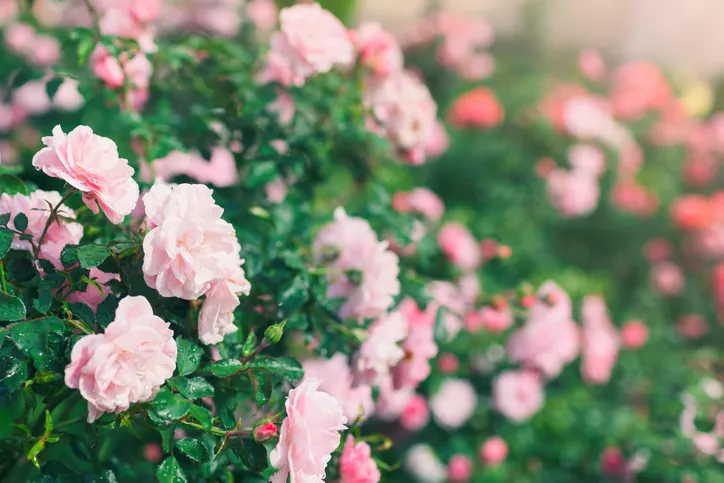- What should be considered when fertilizing?
- How do you water these roses correctly?
- Which parts of the plant should you cut and when?
- Under what circumstances should you overwinter the ground cover roses?
- What Diseases Commonly Affect Ground Cover Roses?
They are considered to be particularly robust among roses and are often planted as public greenery in parks and on roadsides and roadsides. Ground cover roses are planted in no time. But is the care also child's play or does it take a lot of time?
 Ground cover roses only need a lot of water in summer and when it is very dry
Ground cover roses only need a lot of water in summer and when it is very dry
What should be considered when fertilizing?
In order for ground cover roses to bloom profusely over a long period of time, they need a lot of nutrients. When planting, it is advisable to add some horn shavings (€32.93) or compost to the soil.
After planting, fertilizing takes place every year in spring, just before sprouting, around the end of February/beginning of March. Now the ground cover roses can be fertilized at intervals of 4 to 6 weeks. All sorts of organic fertilizers are suitable for fertilizing, such as:
- compost
- horn shavings
- nettle manure
- comfrey manure
- pond water
- Damn
How do you water these roses correctly?
Not too much can go wrong when casting:
- pour to grow
- water in summer when it is hot and dry
- use low-lime irrigation water
- pour directly onto the root area (never onto the leaves!)
- like to mulch as a precaution
Which parts of the plant should you cut and when?
Autumn is the ideal time to cut ground cover roses. When pruning, old, diseased, weak and dead shoots are completely removed. In addition, a pruning can be done about every 2 to 4 years. The ground cover roses are cut down to 15 cm. This rejuvenates the plant and causes it to produce new shoots.
Under what circumstances should you overwinter the ground cover roses?
If you planted your groundcover roses in the fall, you should protect them for the first winter. The easiest way to do this is with a layer of compost soil, leaves or brushwood. The selected material is heaped or laid over the root area.
What Diseases Commonly Affect Ground Cover Roses?
It is primarily fungal pathogens that are favored by an unfavorable location (sheltered location) or other factors that afflict the ground cover roses. As a rule, the fungal pathogens attack the leaves and can be recognized by white or brownish spores. Infected parts should be cut off immediately!
tips
Groundcover rose varieties such as 'Swany' or 'The Fairy' grow more beautifully if they are pruned back heavily each year.